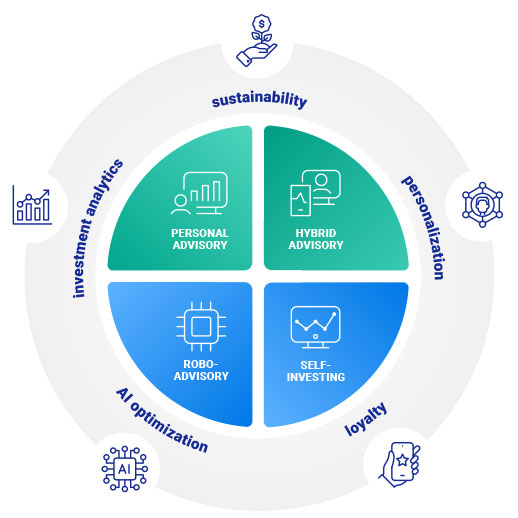Wealth Management Platform Market: Comprehensive Analysis
Market Overview
The wealth management platform market is witnessing significant growth driven by increasing demand for digital financial services, the rising adoption of automated wealth management solutions, and the growing need for financial advisors to offer personalized investment strategies. A wealth management platform is a comprehensive suite of tools and services designed to help financial advisors and firms manage their clients' wealth effectively. These platforms integrate various functionalities including portfolio management, financial planning, risk management, and client communication. The wealth management platform market is expecting significant growth during the ongoing forecast period of 2022-2030.
Request To Free Sample of This Strategic Report - https://www.marketresearchfuture.com/sample_request/6299
Key Market Segments
The wealth management platform market can be segmented based on deployment type, advisory model, end-user, and region.
1. Deployment Type:
-
On-Premise: Traditional deployment where the platform is hosted on the firm’s own servers.
-
Cloud-Based: Increasingly popular due to its scalability, cost-effectiveness, and ease of access.
2. Advisory Model:
-
Human Advisory: Platforms that support human financial advisors with advanced tools.
-
Robo Advisory: Fully automated advisory services powered by AI and algorithms.
-
Hybrid Advisory: Combines both human and robo-advisory services.
3. End-User:
-
Banks: Large financial institutions offering wealth management services.
-
Investment Firms: Firms specializing in investment management.
-
Brokerage Firms: Companies that facilitate the buying and selling of securities.
-
Others: Including insurance companies and financial planners.
Industry Latest News
The wealth management platform market is characterized by rapid technological advancements and strategic collaborations. Recently, several key developments have shaped the industry:
-
Acquisitions and Mergers: Major players are acquiring smaller firms to enhance their technological capabilities and market reach. For instance, in 2023, Morgan Stanley acquired E*TRADE to bolster its wealth management and digital capabilities.
-
Technological Integration: Platforms are increasingly integrating AI and machine learning to offer predictive analytics and personalized investment advice. Companies like Charles Schwab are leveraging AI to improve client engagement and operational efficiency.
-
Regulatory Changes: Evolving financial regulations are prompting wealth management platforms to enhance their compliance features. The implementation of stricter data privacy laws is influencing how these platforms handle client data.
Wealth Management Platform Companies
Several key players dominate the wealth management platform market, each offering a range of services and technological innovations:
-
SS&C Technologies: Known for its comprehensive financial software solutions, SS&C Technologies provides robust wealth management platforms catering to diverse financial services.
-
Fidelity National Information Services (FIS): FIS offers advanced wealth management solutions focusing on seamless client experiences and operational efficiencies.
-
Charles Schwab: A major player providing a blend of traditional and robo-advisory services, known for its user-friendly platforms and extensive research tools.
-
Envestnet: Specializes in integrated solutions that combine financial planning, portfolio management, and reporting capabilities.
-
Temenos: Offers cloud-native wealth management solutions aimed at enhancing customer engagement and operational agility.
Market Drivers
Several factors are driving the growth of the wealth management platform market:
1. Increasing Demand for Digital Solutions: Clients are increasingly preferring digital financial services for their convenience, accessibility, and real-time capabilities. This trend is pushing wealth management firms to adopt advanced digital platforms.
2. Rising Affluence and Investment Awareness: With increasing global wealth and greater awareness about investment opportunities, there is a growing demand for sophisticated wealth management services that can provide personalized investment strategies.
3. Technological Advancements: The integration of AI, big data, and machine learning into wealth management platforms is revolutionizing how services are delivered. These technologies enable predictive analytics, risk assessment, and tailored financial advice.
4. Regulatory Compliance: Stricter regulations around financial services and data protection are driving firms to adopt platforms that ensure compliance and enhance transparency.
5. Hybrid Advisory Models: The growing popularity of hybrid advisory models, which combine human expertise with robo-advisory efficiency, is expanding the market. This model appeals to clients who seek personalized advice with the convenience of automation.
Ask for Customization - https://www.marketresearchfuture.com/ask_for_customize/6299
Regional Insights
The wealth management platform market exhibits varied growth patterns across different regions:
1. North America: Dominates the market due to the high concentration of wealth management firms, advanced technological infrastructure, and early adoption of digital solutions. The presence of major players such as Charles Schwab and Fidelity Investments further boosts the market.
2. Europe: The market in Europe is driven by stringent regulatory requirements, which are pushing firms to adopt advanced compliance and reporting tools. Additionally, the rise in high-net-worth individuals (HNWIs) in countries like Germany and the UK is fostering market growth.
3. Asia-Pacific: This region is experiencing rapid growth owing to the increasing affluence, growing awareness about wealth management, and a burgeoning middle class. Countries like China, India, and Japan are witnessing significant investments in digital wealth management solutions.
4. Middle East and Africa: The market here is still in its nascent stages but is poised for growth due to increasing wealth and investment activities. The adoption of digital solutions is gradually picking up, driven by regulatory changes and the need for more sophisticated financial services.
5. Latin America: The market is growing steadily, with a focus on digital transformation and improved financial literacy. Countries like Brazil and Mexico are emerging as key markets due to their expanding financial sectors and rising middle-class populations.
Conclusion
The wealth management platform market is set for continued growth, fueled by technological advancements, increasing demand for digital financial services, and the evolving regulatory landscape. Key players are continuously innovating to offer more sophisticated, secure, and user-friendly platforms. As wealth management firms seek to provide personalized, efficient, and compliant services, the adoption of advanced wealth management platforms is expected to rise significantly across the globe. The market presents lucrative opportunities for both existing players and new entrants aiming to leverage the growing demand for digital and hybrid advisory solutions.



